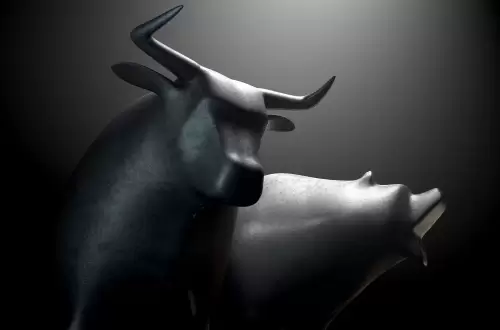 |
|
 |
|
 |
|
 |
|
 |
|
 |
|
 |
|
 |
|
 |
|
 |
|
 |
|
 |
|
 |
|
 |
|
 |
|
Cryptocurrency News Articles
One Big Beautiful Bill could add over $2.4 trillion to the US debt
Jun 13, 2025 at 04:04 am
President Trump’s One Big Beautiful Bill could add over $2.4 trillion to the US debt, accelerating a looming debt crisis and spiking inflation.
The nonpartisan Congressional Budget Office (CBO) has estimated that the "One Big Beautiful Bill" could add over $2.4 trillion to the US debt over a decade.
The bill, which passed the House on May 22 and is now pending in the Senate, would cut federal revenue by $3.67 trillion and spending by $1.25 trillion, according to the CBO.
The nonpartisan forecaster also estimated that when taking interest payments into account, the bill’s cost could rise to $3 trillion over a decade or to $5 trillion if temporary tax cuts were made permanent. Some of the bill’s supporters argue that tax cuts would stimulate the economy and “pay for themselves.”
However, the experience of the 2017 tax cuts showed that, even including positive economic effects, they had increased the federal deficit by almost $1.9 trillion over a decade, according to the CBO.
The spiral of budget deficits and debt has already sucked in the US economy, and there is no credible plan to reverse it. But it seems that no one cares.
The US cannot "grow its way out" of debt
The US will not magically “grow its way out” of this problem. As Sina, the co-founder of 21st Capital, noted on X,
This is a bleak scenario, considering that Q1 2025 registered -0.3% real GDP growth, and the US Federal Reserve is estimating Q2 2025 growth at 3.8%.
The experience of the 2017 tax cuts showed that, even including positive economic effects, they had increased the federal deficit by almost $1.9 trillion over a decade, according to the CBO.
The spiral of budget deficits and debt has already sucked in the US economy, and there is no credible plan to reverse it. But it seems that no one cares.
The US will not magically “grow its way out” of this problem. As Sina, the co-founder of 21st Capital, noted on X,
This is a bleak scenario, considering that Q1 2025 registered -0.3% real GDP growth, and the US Federal Reserve is estimating Q2 2025 growth at 3.8%, such a scenario remains unrealistic.
The nonpartisan forecaster also estimated that when taking interest payments into account, the bill’s cost could rise to $3 trillion over a decade or to $5 trillion if temporary tax cuts were made permanent. Some of the bill’s supporters argue that tax cuts would stimulate the economy and “pay for themselves.”
The experience of the 2017 tax cuts showed that, even including positive economic effects, they had increased the federal deficit by almost $1.9 trillion over a decade, according to the CBO.
The nonpartisan Congressional Budget Office (CBO) has estimated that the "One Big Beautiful Bill" could add over $2.4 trillion to the US debt over a decade.
The bill, which passed the House on May 22 and is now pending in the Senate, would cut federal revenue by $3.67 trillion and spending by $1.25 trillion, according to the CBO.
The nonpartisan forecaster also estimated that when taking interest payments into account, the bill’s cost could rise to $3 trillion over a decade or to $5 trillion if temporary tax cuts were made permanent. Some of the bill’s supporters argue that tax cuts would stimulate the economy and “pay for themselves.”
The experience of the 2017 tax cuts showed that, even including positive economic effects, they had increased the federal deficit by almost $1.9 trillion over a decade, according to the CBO.
The spiral of budget deficits and debt has already sucked in the US economy, and there is no credible plan to reverse it. But it seems that no one cares.
The US will not magically “grow its way out” of this problem. As Sina, the co-founder of 21st Capital, noted on X,
This is a bleak scenario, considering that Q1 2025 registered -0.3% real GDP growth, and the US Federal Reserve is estimating Q2 2025 growth at 3.8%, such a scenario remains unrealistic.
The nonpartisan forecaster also estimated that when taking interest payments into account, the bill’s cost could rise to $3 trillion over a decade or to $5 trillion if temporary tax cuts were made permanent. Some of the bill’s supporters argue that tax cuts would stimulate the economy and “pay for themselves.”
The experience of the 2017 tax cuts showed that, even including positive economic effects, they had increased the federal deficit by almost $1.9 trillion over a decade, according to the CBO.
The spiral of budget deficits and
Disclaimer:info@kdj.com
The information provided is not trading advice. kdj.com does not assume any responsibility for any investments made based on the information provided in this article. Cryptocurrencies are highly volatile and it is highly recommended that you invest with caution after thorough research!
If you believe that the content used on this website infringes your copyright, please contact us immediately (info@kdj.com) and we will delete it promptly.
-

-

-

-

- South Korea is all set to dramatically reshape its digital asset landscape, potentially positioning itself as a global leader in cryptocurrency regulations.
- Jun 14, 2025 at 02:20 pm
- Under the leadership of newly-elected President Lee Jae-myung, the ruling Democratic Party has unveiled the Digital Asset Basic Act.
-

-
![Dogecoin [DOGE] Reclaims Market Attention After a Clean Breakout Past Resistance Dogecoin [DOGE] Reclaims Market Attention After a Clean Breakout Past Resistance](/assets/pc/images/moren/280_160.png)
-

-
![dogwifhat [WIF] retested its former range high as support earlier in June. The most recent retest yielded a positive price reaction for the memecoin. dogwifhat [WIF] retested its former range high as support earlier in June. The most recent retest yielded a positive price reaction for the memecoin.](/assets/pc/images/moren/280_160.png)
-



























































![Dogecoin [DOGE] Reclaims Market Attention After a Clean Breakout Past Resistance Dogecoin [DOGE] Reclaims Market Attention After a Clean Breakout Past Resistance](/uploads/2025/06/11/cryptocurrencies-news/articles/dogecoin-doge-reclaims-market-attention-clean-breakout-resistance/684964f4a124a_image_500_300.webp)

![dogwifhat [WIF] retested its former range high as support earlier in June. The most recent retest yielded a positive price reaction for the memecoin. dogwifhat [WIF] retested its former range high as support earlier in June. The most recent retest yielded a positive price reaction for the memecoin.](/uploads/2025/06/11/cryptocurrencies-news/articles/dogwifhat-wif-retested-range-support-earlier-june-retest-yielded-positive-price-reaction-memecoin/6849648fbd663_image_500_300.webp)
